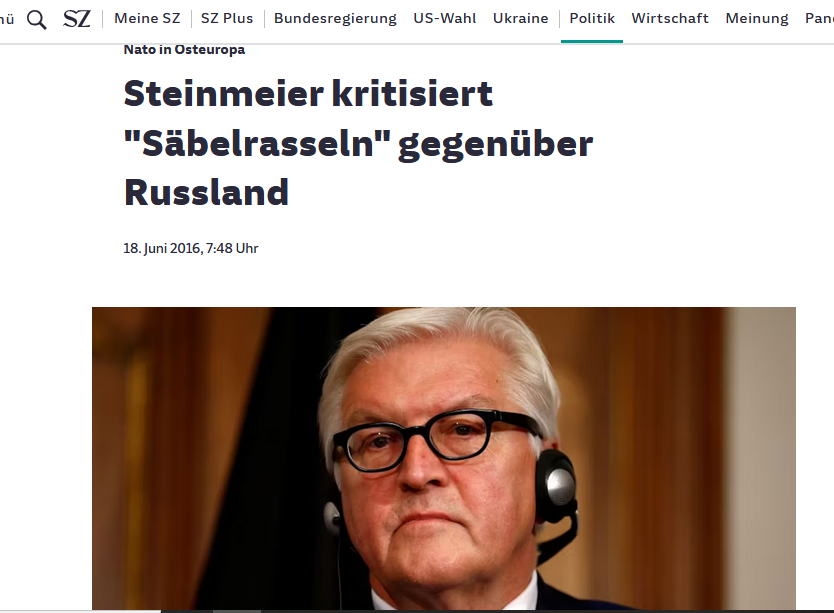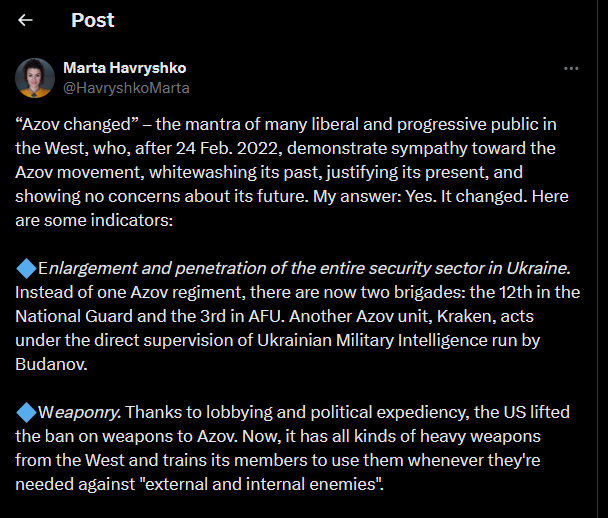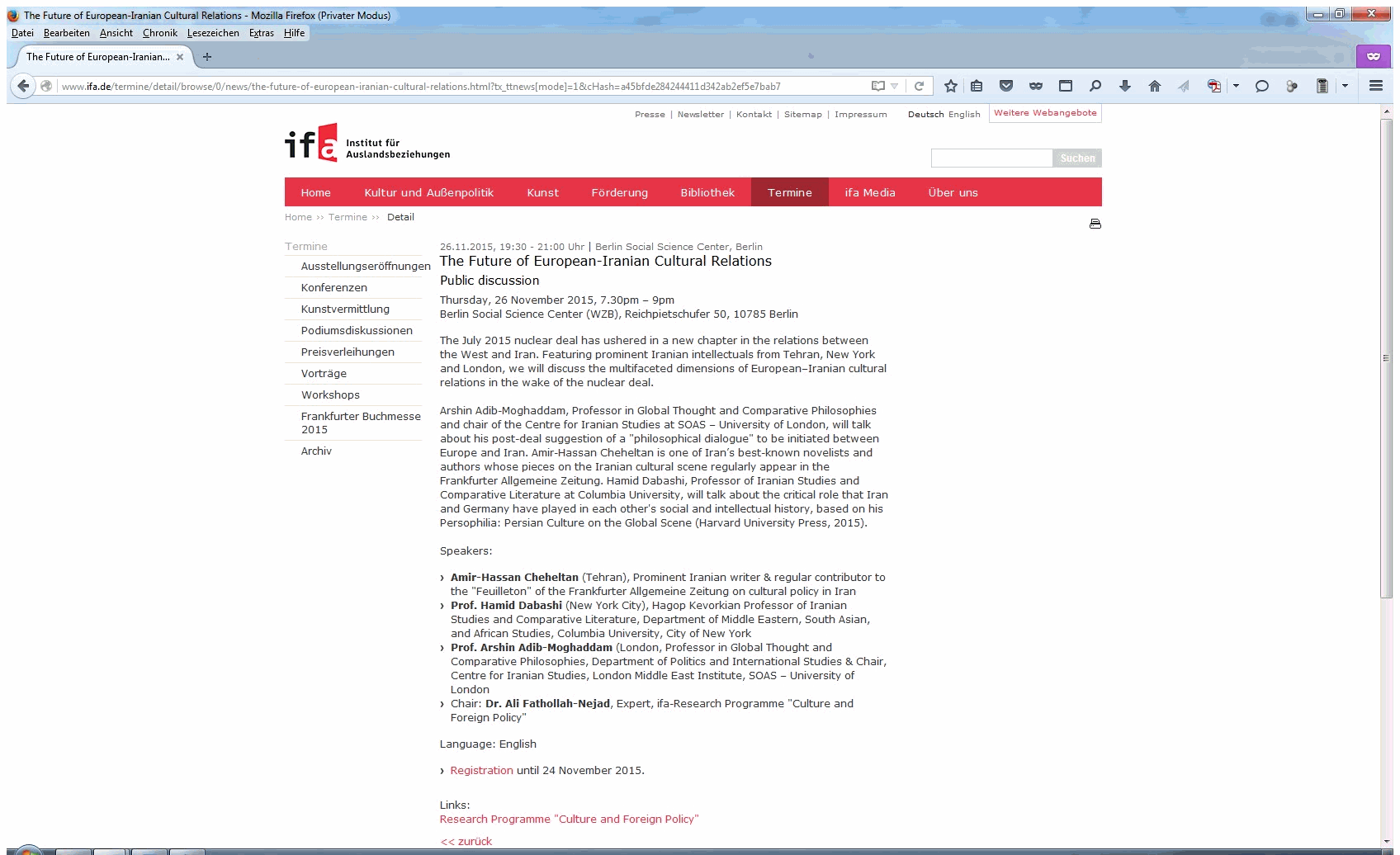Von Dr. phil. Clemens Heni, Direktor, The Berlin International Center for the Study of Antisemitism (BICSA)
Der Krieg in der Ukraine muss enden. Er muss umgehend enden und es wird einen Kompromiss geben.
Der völkerrechtswidrige Angriff Russlands von Ende Februar 2022 hätte bekanntlich schon im April 2022 mit dem vollständigen Rückzug Russlands auf die Linien vor dem 24.02.2022 enden können, wären nicht fanatische Russenfeinde wie Boris Johnson und die NATO dagegen gewesen. Der damalige israelische Premierminister Naftali Bennett hätte es fast geschafft, dass Putin und Selenskyi einen Waffenstillstand vereinbarten oder gar einen Friedensvertrag, wie auch die Zeitschrift Foreign Affairs konzedieren muss.
Doch die regelrechte Kriegshetze von Boris Johnson aus England und der NATO aus den USA sowie aus Europa verhinderte das. Dadurch sind Zehntausende Ukrainer und Russen an der Front gestorben, zu den Tausenden Zivilist*innen hinzu. Das wäre vermeidbar gewesen. Aber der Westen wollte keinen Kompromiss. Das sind Fakten.
Das entbindet Putin nicht von seiner Verantwortung für den Krieg – aber es kontextualisiert ihn.
Doch Kontext ist das allerletzte was Rechte und Großagitatoren wollen.
Nehmen wir die Rede des Schriftstellers (!) Marko Martin im Schloss Bellevue vor wenigen Tagen anlässlich des 35. Jahrestages des Mauerfalls. Er attackierte ausgerechnet den Gastgeber Bundespräsident Frank-Walter Steinmeier für seine Ukraine-Politik als Außenminister vor einigen Jahren. Als ob Steinmeier sich nicht klar gegen Putin ausgesprochen hätte und die Militarisierung der Bundesrepublik durch Olaf Scholz seit dem 27. Februar 2022 (100 Milliarden Sondervermögen für die Bundeswehr) nicht vollends mittragen würde.
Aber das reicht vielen nicht. Die FAZ, die WELT oder der Perlentaucher schäumen vor Wut und klatschen ob der Schriftsteller-Rede Marko Martins, die in der WELT auch publiziert wurde.
Dass Putin ein brutaler Herrscher ist, der einen Verleger wie mich durchaus 15 Tage ins Gefängnis stecken oder mit Geldstrafe belegen würde, weil mein Verlag Edition Critic unter anderem Bücher zur Kritik der Normalfamilie oder zur Unterstützung kinderfreien Lebens publiziert, ist bekannt. Putin lässt auch Dissidenten ermorden. Sein Außenminister Lawrow hat sich 2022 widerwärtig antisemitisch geäußert. Das ist alles dokumentiert.
Was aber gerade in Deutschland kaum diskutiert wird, ist der Antisemitismus und Neonazismus in der Ukraine. Und das spricht Bände. Es ist sicher kein Zufall, dass Marko Martin den X-Account der ukrainischen Historikerin Marta Havryshko nicht zitiert in seiner agitatorischen Rede im Schloss Bellevue. Denn dann müsste er erkennen, dass beide Seiten höchst problematisch sind: Putin und Russland sowie Selenskyi und die Ukraine und als dritter sehr gefährlicher Faktor natürlich die NATO und der Westen, der 2014 seine eigene Rolle spielte beim Maidan-Putsch, wie der CIA ja selbst zugab. Es ist also vermutlich viel komplexer als es ein aus Sachsen im Mai 1989 geflüchteter heutiger Schriftsteller zu erkennen vermag.
Das Dramatische ist, dass Steinmeier selbst ja gar nicht mehr so handelt oder redet, wie er es 2016 noch tat – und gerade diese diplomatischen Worte sind den heutigen Kriegstreibern und Säbelrasslern ein Dorn im Auge. Die Süddeutsche Zeitung schrieb 2016, als Steinmeier noch Außenminister und Merkel Kanzlerin war:
„Angesichts der Nato-Militärmanöver und der geplanten Truppenstationierung in Osteuropa warnt Außenminister Steinmeier vor einem Abschreckungskurs gegenüber Russland.
Die Geschichte lehre, dass neben dem gemeinsamen Willen zur Verteidigungsbereitschaft auch immer auch die Bereitschaft zum Dialog und Kooperationsangebote geben müsse, sagte er.“
Weiter heißt es in der SZ:
„Bundesaußenminister Frank-Walter Steinmeier (SPD) hat die Nato-Manöver in Osteuropa kritisiert und fordert stattdessen mehr Dialog und Kooperation mit Russland. ‚Was wir jetzt nicht tun sollten, ist durch lautes Säbelrasseln und Kriegsgeheul die Lage weiter anzuheizen‘, sagte er der Bild am Sonntag.“
Schauen wir mal, was heute parallel zu dem Krieg in der Ukraine passiert. Wie sich die politische Kultur entwickelt, wie mit der ukrainischen Geschichte umgegangen wird.
Ich nehme mal den X-Account der ukrainischen Historikerin Marta Havryshko, die seit wenigen Jahren in den USA lehrt. Am 13. Oktober 2024 schreibt sie (alle Beiträge sind auf Englisch, übersetzt mit der kostenlosen Version von DeepL):
„Wie Asow zur Gewalt gegen seine Kritiker anstiftet? Meine Geschichte Im September 2023 eröffnete die 3. Sturmbrigade (Asow-Bewegung) eine Ausstellung im Museum von Kiew, in der ihre Kämpfer mit Angehörigen der Waffen-SS-Division Galizien verglichen wurden. Ich habe dazu einen kleinen kritischen Beitrag auf meiner Facebook-Seite verfasst. Der Hauptgedanke war: Die Verherrlichung von Nazi-Kollaborateuren schadet der ukrainischen Demokratie und nährt die Kreml-Propaganda.“
Am 16. Oktober 2024 schreibt die ukrainische Historikerin:
“ ‚Asow hat sich verändert‘ – das Mantra vieler liberaler und fortschrittlicher Menschen im Westen, die nach dem 24. Februar 2022 Sympathie für die Asow-Bewegung zeigen, ihre Vergangenheit beschönigen, ihre Gegenwart rechtfertigen und sich keine Sorgen um ihre Zukunft machen. Meine Antwort? Ja. Sie hat sich verändert. Hier sind einige Indikatoren:
Vergrößerung und Durchdringung des gesamten Sicherheitssektors in der Ukraine. Anstelle eines Asow-Regiments gibt es jetzt zwei Brigaden: die 12. in der Nationalgarde und die 3. in der AFU. Eine weitere Asow-Einheit, Kraken, agiert unter der direkten Aufsicht des ukrainischen Militärgeheimdienstes unter der Leitung von Budanow.
Bewaffnung. Dank Lobbyarbeit und politischer Zweckmäßigkeit haben die USA das Waffenverbot für Asow aufgehoben. Jetzt verfügt sie über alle möglichen schweren Waffen aus dem Westen und bildet ihre Mitglieder darin aus, sie bei Bedarf gegen ‚äußere und innere Feinde‘ einzusetzen.
Entschuldigung früherer krimineller Aktivitäten. Einige Mitglieder von Asow waren in kriminelle Aktivitäten verwickelt und wurden vor 2022 wegen Gangstertums inhaftiert, aber nach dem Beginn der groß angelegten russischen Invasion in der Ukraine wieder freigelassen. Jetzt werden sie als ‚Freiheitskämpfer‘ gefeiert und ausgezeichnet.
Unterstützung durch die Medien. Asow genießt eine enorme Medienpräsenz. Viele ukrainische und ausländische Medien tappen in die Falle der ‚Elitebrigaden‘, ‚wahren Patrioten‘ und ‚einfachen Nationalisten‘. Sie stellen die Ideologie von Asow nicht in Frage und sind nicht bereit, die Mitglieder von Asow direkt mit harten Fragen über ihre Ideologie und politischen Pläne zu konfrontieren.
Rückendeckung von Experten. Einige Wissenschaftler und Analysten spielen die Rolle von Radikalismus und Extremismus in Asow bewusst herunter und argumentieren, dass Asow ‚entpolitisiert‘ sei und dass Behauptungen über seine Bedrohung der Demokratie übertrieben und das Produkt von Kreml-Propaganda seien.
Indoktrination und militärische Ausbildung von Jugendlichen. Centuria, eine paramilitärische Asow-Jugendbewegung, hat ihre Aktivitäten auf die gesamte Ukraine ausgeweitet. Sie dringt in die Schulen ein. Sie bereitet Jugendliche auf die Gewalt auf der Straße vor. Sie wird bereits für politische Gewalt gegen LGBTQI+, feministische und linke Aktivisten eingesetzt.
Mobilisierung von Angst. Asow setzt die Angst vor Russland in der Ukraine und darüber hinaus als Waffe ein. Gemeinsame Slogans: „Sie werden alle Männer töten und alle Frauen vergewaltigen“, ‚Sie werden einen weiteren Holodomor organisieren‘, ‚Sie werden alle Männer für den Krieg gegen die NATO mobilisieren‘ usw.
Zusammenfassend lässt sich sagen: Ja, Asow hat sich nach dem Februar 2022 drastisch verändert, aber vor allem hat sich die Haltung vieler Liberaler gegenüber Asow geändert, nicht sein Wesen.“
Am 30. Oktober 2024 schreibt sie:
„Ich habe den Maidan unterstützt, weil ich glaube, dass jeder in dunklen Zeiten seine eigene Wahl treffen sollte. Der Maidan wurde jedoch von Radikalen und Extremisten mit Bandera-Porträts und dem Wolfsangel-Symbol gekapert. Sie setzten ihre ethno-nationalistische Agenda durch, was mehr Bandera-Statuen und mehr Wolfsangel-Symbole auf die Straßen der Ukraine brachte.
Jedes kritische Denken über OUN und UPA wird als ‚Kreml-Propaganda‘ bezeichnet. ‚Unbequeme‘ Historiker werden schikaniert, bedroht und wegen fehlenden ‚Nationalbewusstseins‘ und ‚Patriotismus‘ entlassen. Zum ersten Mal in der ukrainischen Geschichte nach 1991 fand 2021 im Kiewer Stadtzentrum ein Gedenkmarsch zur Erinnerung an die Division Waffen-SS Galizien statt. Im Jahr 2024 eröffnete die ukrainische Botschaft in Litauen eine Ausstellung zu Ehren der Division. Ich stand mit meiner Kritik daran allein da. Andere taten so, als würden sie diese beunruhigende Wendung nicht sehen. „Blindheit“, ‚Selbstzensur‘ und ‚performativer Patriotismus‘ wurden zu den wichtigsten Strategien der Intellektuellen in der Ukraine während des Krieges. Viele ihrer westlichen Kollegen missverstanden all diese Entwicklungen als „Entkolonialisierung“ und das Recht auf ‚Selbstbestimmung‘ und machten Wissenschaftler wie mich in diesem makabren ’nationalistischen Karneval‘ noch einsamer.“
Und am 4. November 2024 hat sie noch einen Post, den sich die Marko Martins dieser Welt mal durchlesen sollten:
„Liebe westliche Freunde, hören Sie auf, mir, einem ukrainischen Bürger, dessen Brüder in der UAF dienen, dessen andere Verwandte aufgrund schwerer Verletzungen demobilisiert wurden und dessen einer nur einen Monat nach seiner Einberufung an der Front starb, Vorträge darüber zu halten, wie ich die Zwangsmobilisierung und den Kampf bis zum ‚Sieg‘ unterstützen soll.
Hören Sie auf, mich, eine Holocaust-Historikerin, darüber zu belehren, was ich von der wachsenden Zahl der Bandera- und Shukhevych-Straßen, der Teliha-Statue in Babyn Yar, der Verherrlichung der Waffen-SS-Division Galizien und der Wolfsangel-Abzeichen im ukrainischen Militär halten soll.
Hören Sie auf, mich zu belehren, eine Tochter, die das Grab ihrer Mutter in der Ukraine wegen der Todesdrohungen von Rechtsextremen nicht besuchen kann, wie ich ihren Einfluss „übertreibe“, während sie ‚wahre Patrioten‘ und ‚effektivste Kämpfer‘ sind, die mich vor den russischen Besatzern ‚beschützen‘.
Hören Sie auf, mich über die ‚richtige‘ Entkolonialisierung zu belehren, während Sie Ihre eigene koloniale Haltung mir und anderen Ukrainern gegenüber nicht reflektieren, die es ‚wagen‘, Ihre ‚korrekte‘ Wahrnehmung von der Ukraine zu kritisieren.“
Das führt mich zu einer Liste von Pro-Nazikollaboration-Denkmälern in der Ukraine, die schon vor dem aktuellen Krieg publilziert wurde. Es geht um folgende Beispiele, die Teil einer umfassenden investigativen Recherche des Journalisten Lev Golinkin sind, die er am 27. Januar 2021 im jüdischen Forward publizierte. Ich habe dazu am 27. Januar 2023 geschrieben:
In der westukrainischen Stadt L’viv wurde 2007 ein Monument zum Gedenken an Stepan Bandera eingeweiht, dem antisemitischen Nazi-Kollaborateur und Anführer der Organisation Ukrainischer Nationalisten (OUN-B). Man kann ein Bild der Einweihungszeremonie hier sehen, rechts ist ein Denkmal für Bandera in der Stadt Ivano-Frankivsk abgebildet:
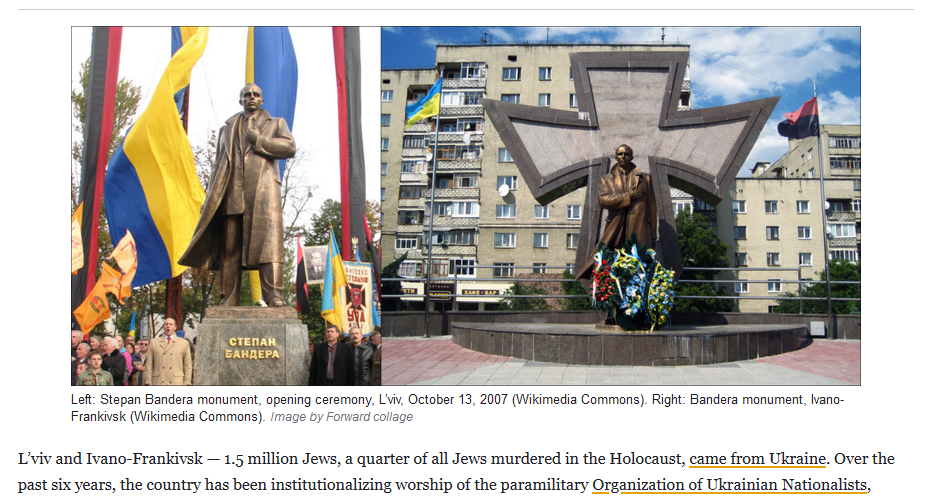
Screenshot, https://forward.com/news/462916/nazi-collaborator-monuments-in-ukraine/ (27.01.2023)
In der Stadt Zhovkva gab es 1941 auf einem Tor die Aufschrift „Heil Hitler“ und „Glory to Bandera“ (auf ukrainisch):
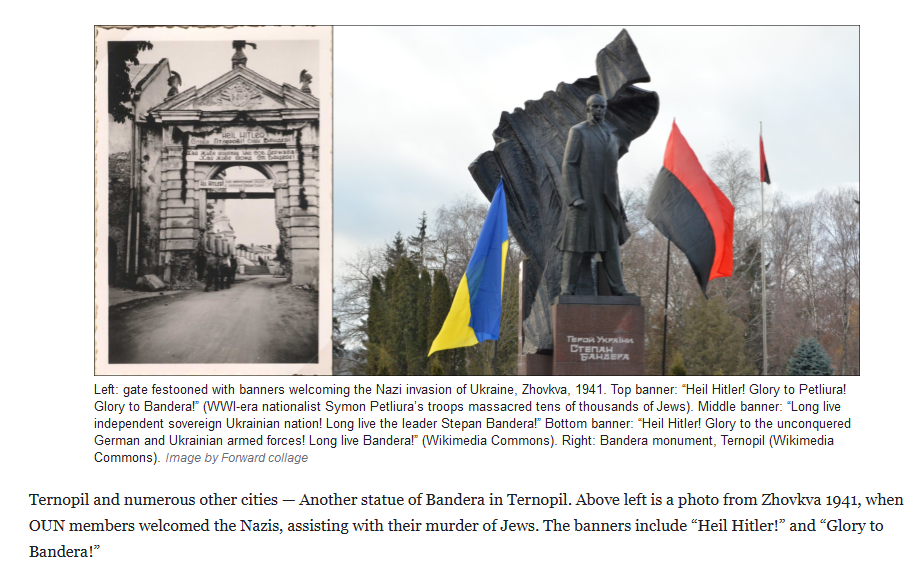
Screenshot, https://forward.com/news/462916/nazi-collaborator-monuments-in-ukraine/ (27.01.2023)
Golinkin führt eine riesige Zahl von Orten auf, die eine Straße, einen Platz oder Monument haben, die nach Bandera benannt sind:
- joint monuments to him and Roman Shukhevych in Cherkasy, Horishniy, Pochaiv, Rudky and Zaviy;
- a monument to him, Shukhevych and other OUN leaders in Morshyn;
- a monument to him and his father in Pidpechery;
- a plaque and monument in Lutsk;
- a bas-relief, monument and museum in Dubliany;
- a plaque, monument and museum (with bust) in Stryi;
- a plaque, street and monument in Zdolbuniv;
- monuments in Berezhany, Boryslav, Buchach, Chervonohrad, Chortkiv, Drohobych, Dubno, Hordynya, Horodenka, Hrabivka (Ivano-Frankivsk Raion), Kalush, Kamianka-Buzka, Kolomiya, Kozivka, Kremenets, Krushel’nytsya, Kyiv, L’viv, (and a plaque), Mlyniv,Mostyska, Mykolaiv (L’viv Oblast), Mykytyntsi, Nyzhnye (Sambir Raion), Pidvolochysk, Romanivka, Sambir, Skole, Sniatyn, Staryi Sambir, Seredniy Bereziv, Sokal, Sosnivka, Strusiv, Tatariv, Terebovlia, Truskavets, Turka, Uzyn, Velyki Mosty, Verbiv (Narayiv Hromada), Zahirochka and Zalishchyky;
- a plaque and street in Sniatyn and Zhytomyr;
- plaques in Ivano-Frankivsk, Khmelnytskyi and Rivne;
- museums in Staryi Uhryniv (with a statue and memorial plaque) and Volya-Zaderevatska (with a bust and bas-relief);
- a park in Kamianka-Buzka;
- a street in Dnipro; and a school in Dobromyl.
Im Oktober 2022 hat die Redaktion des Forward die Benennung einer Straße nach Stepan Bandera in den Städten Dnipro und Tatariv hinzugefügt. Es gehört also zur ukrainischen Kriegspolitik, auch heute Straßen nach Nazi-Kollaborateuren zu benennen.
Jaroslav Stetsko schrieb am 9. Juli 1941 in einem Lebenslauf:
Ich unterstütze daher die Vernichtung der Juden und die Zweckmäßigkeit, deutsche Methoden der Judenvernichtung in die Ukraine zu bringen, unter Ausschluss ihrer Assimilation und dergleichen.
[I therefore support the destruction of the Jews and the expedience of bringing German methods of exterminating Jewry to Ukraine, barring their assimilation and the like.]
Darauf weist ein wissenschaftlicher Artikel in den Harvard Ukrainian Studies im Jahr 1999 hin.
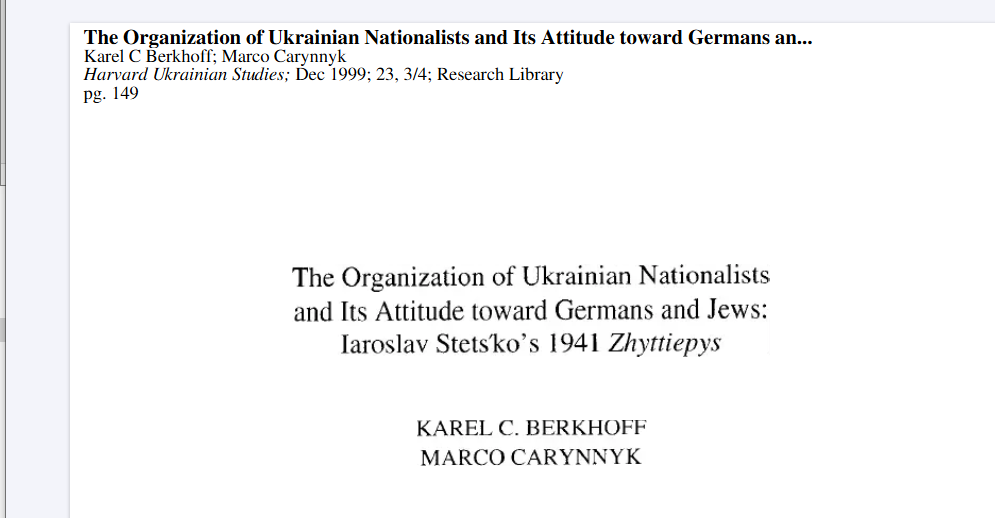
Screenshot, https://www.academia.edu/2469365/The_Organization_of_Ukrainian_Nationalists_and_Its_Attitude_toward_Germans_and_Jews?auto=download (27.01.2023)
Es gibt unter anderem in den Städten Stryi und Velykyi Hlybochok in der Ukraine Statuen zu Ehren Stetskos.
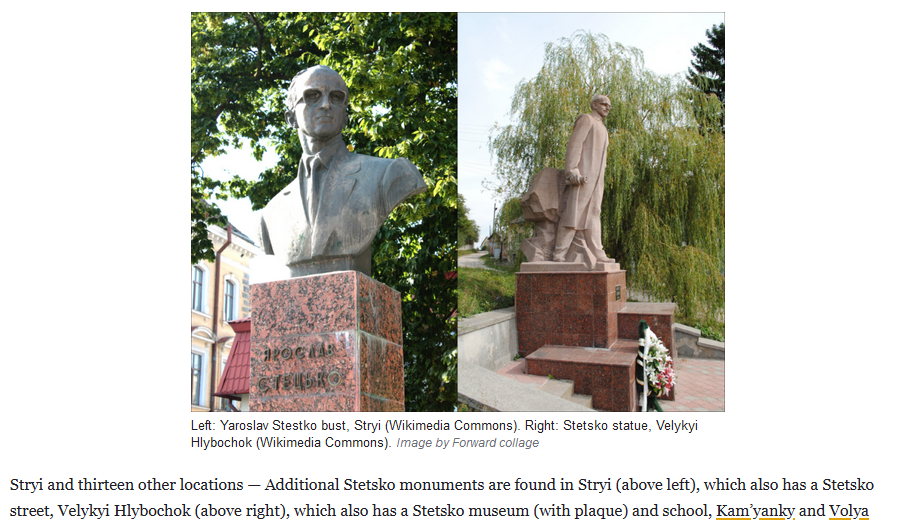
Screenshot, https://forward.com/news/462916/nazi-collaborator-monuments-in-ukraine/ (27.01.2023)
Es ist kein Zufall, dass die USA so obsessiv und fanatisch die Ukraine unterstützen, der Antikommunismus ist in den USA eine Art Staatsreligion. Hier sieht man den damaligen US-Vizepräsidenten George W. H. Bush (1924-2018) mit Jaroslav Stetsko im Jahr 1983:
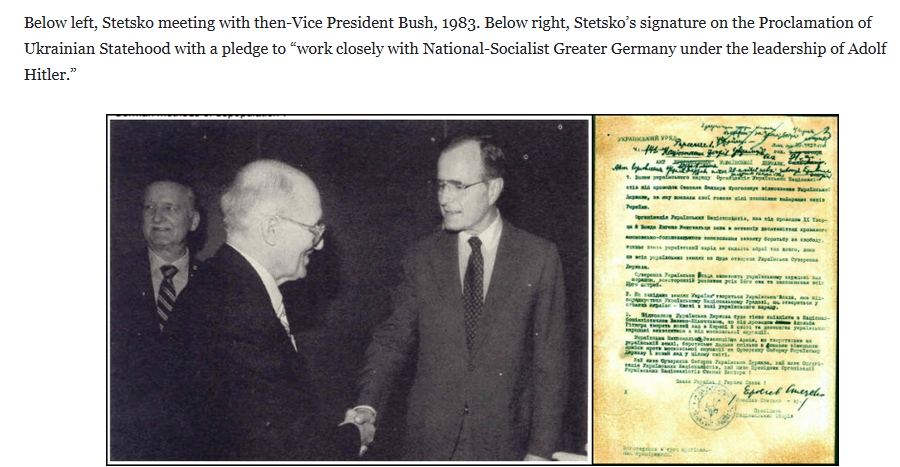
Screenshot, https://forward.com/news/462916/nazi-collaborator-monuments-in-ukraine/ (27.01.2023)
Dmytro Paliiv (1896–1944), SS-Hauptsturmführer der 14. Waffen-Grenadier Division (1. SS Division Galizien). Ein Kritiker und ehemaliger Soldat der Roten Armee, der sich gegen die Benennung einer Straße nach dem SS-Mann Paliiv in Kalush unweit von Lviv aussprach, bekam 2017 Morddrohungen.
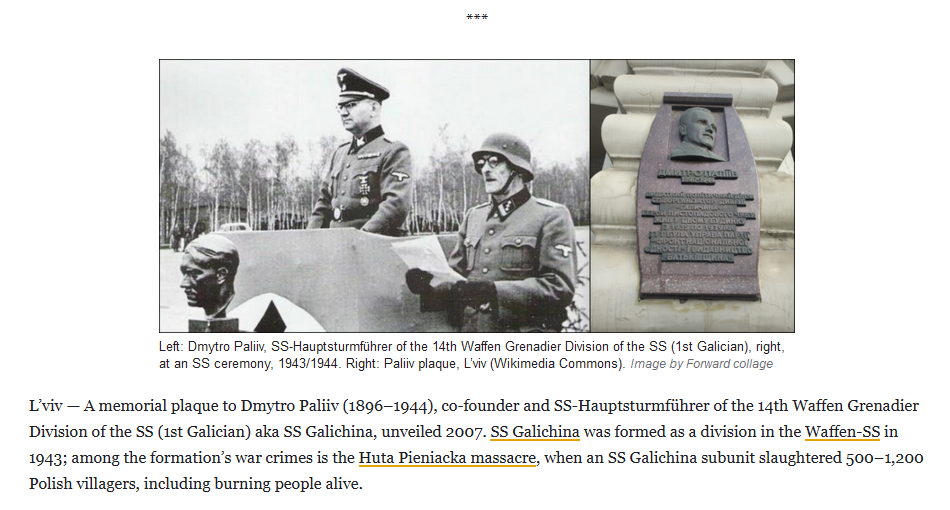
Screenshot, https://forward.com/news/462916/nazi-collaborator-monuments-in-ukraine/ (27.02.2023)
Die OUN-M, benannt nach Andryi Melnyk, feierte in einer ihrer Postillen das größte Massaker im Holocaust, den Mord an 33.000 Juden in Babi Yar am 29. und 30. September 1941 in der Nähe von Kiew. In Volya Yakubova gibt es ein Monument für Melnyk:
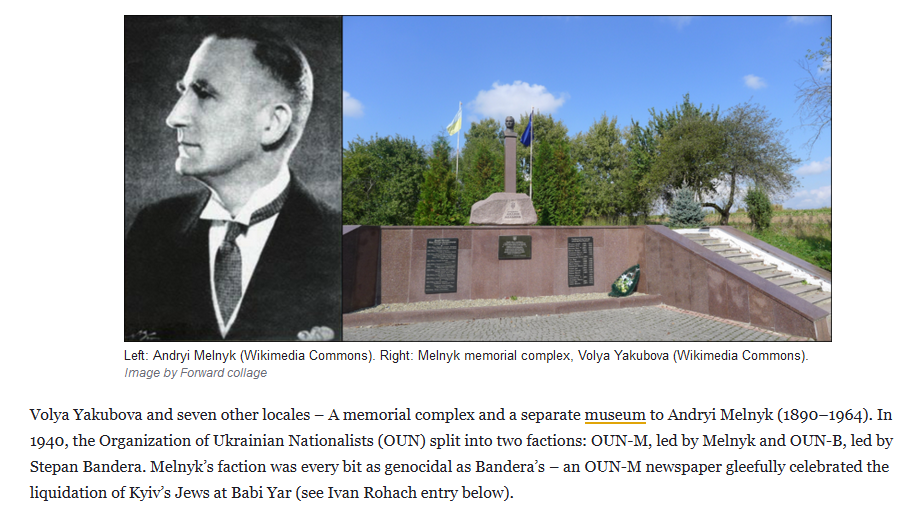
Screenshot, https://forward.com/news/462916/nazi-collaborator-monuments-in-ukraine/ (27.01.2023)
Am 1. August 1941 begrüßte der Bürgermeister von L’viv den Generalgouverneur Hans Frank, einen ganz typischen deutschen Juristen aus Karlsruhe, der frühzeitig NSDAP-Mitglied wurde und 1946 für seine Verbrechen gehängt wurde. Yuri Polyanskiy lebte bis 1986 und wird bis heute in der Ukraine verehrt wie mit solchen Plaketten, unten rechts zu sehen:
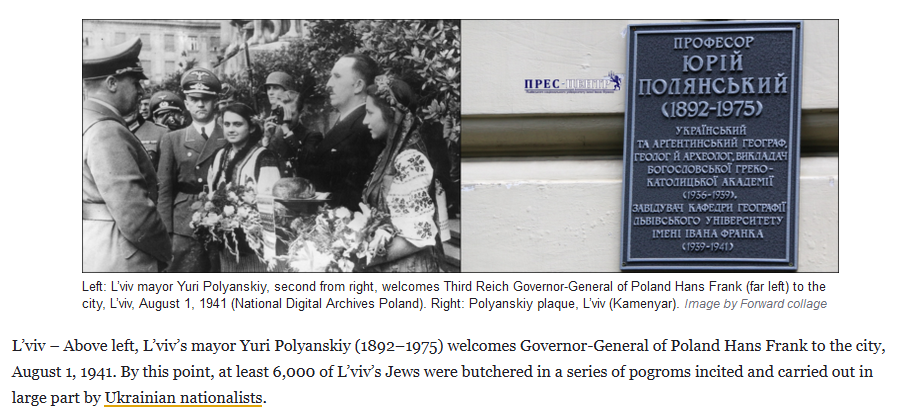
Screenshot, https://forward.com/news/462916/nazi-collaborator-monuments-in-ukraine/ (27.01.2023)
Auch wenn das der WELT, der FAZ oder dem Perlentaucher natürlich noch viel zu wenig ist, kämpft Deutschland doch mit allen Mitteln dafür, dass die Ukraine so bleibt, wie sie ist und weiter Straßen, Denkmäler oder Plätze nach Antisemiten, Nationalisten und Holocausttätern benennen kann. Die oben zitierte ukrainische Holocaustforscherin Marta Havryshko bringt dafür sehr viele Beispiele für die Ehrung von NS-Kollaborateuren hier und heute in der Ukraine.
Es ist klar, dass es nicht die Aufgabe eines Schriftstellers ist, sich wissenschaftlich oder differenziert mit einer Thematik zu befassen. Das ist sein gutes Recht, dafür ist er Schriftsteller. Dafür schreibt er vielleicht gute oder spannende oder nachdenkliche oder sensible oder schlechte Prosa, je nachdem.
Es gibt auch massiven Antisemitismus in Russland, die paramilitärische Wagner-Bande, der rechtsextreme Vordenker Alexander Dugin, die Unterstützung des Iran (auch wenn die vielleicht angesichts des kompletten Versagens der iranischen Luftabwehr angesichts der gezielten Angriffe im Landesinnern von Dutzenden israelischen Kampfjets weniger werden wird, weil das peinlich war für den jihadistischen und islamofaschistischen Iran und einer wie Putin nur starke, brutale und erfolgreiche Partner möchte), aber darüber wird ja auch nonstop gesprochen.
Worüber fast niemand spricht sind die Beispiele aus der Ukraine, die ich in diesem Text bringe.
Welcher SPIEGEL-, Frankfurter-Rundschau-, oder ZEIT-Text, der vielleicht 2014 noch kritisch war gegenüber dem Antisemitismus in der Ukraine, ist das auch heute noch?
Wer aber nicht ein Wort zum Antisemitismus und Neonazismus in der heutigen Ukraine verliert, aber den Bundespräsidenten meint belehren zu müssen über zu wenig Unterstützung dieser neo-nazistischen Tendenzen in der Ukraine – denn jede Waffenlieferung, jede finanzielle oder sonstige Unterstützung, die sich nicht öffentlich (!) gegen die neonazistischen und antisemitischen Tendenzen in der Ukraine wendet, ist eine solche Unterstützung – der sollte einfach mal das tun, was bei den allermeisten Menschen sehr hilfreich ist: einfach mal die Klappe halten.
Wer diese ganze Geschichte mit anderen Beispielen und in einem Film dargestellt sehen möchte, der oder dem sei der Film „The Belarus File“ mit Kojak empfohlen. Der Film ist von 1985, man kann ihn auch im Netz ggf. finden, und ist einer der besten Filme überhaupt. So ein Film wie Casablanca, nur spielt „The Belarus File“ in der Post-Holocaust Zeit und zeigt das typische, unsagbar widerliche Verhalten des Westens (hier: der USA) und ihre Kollaboration mit NS-Tätern.
Danke.


